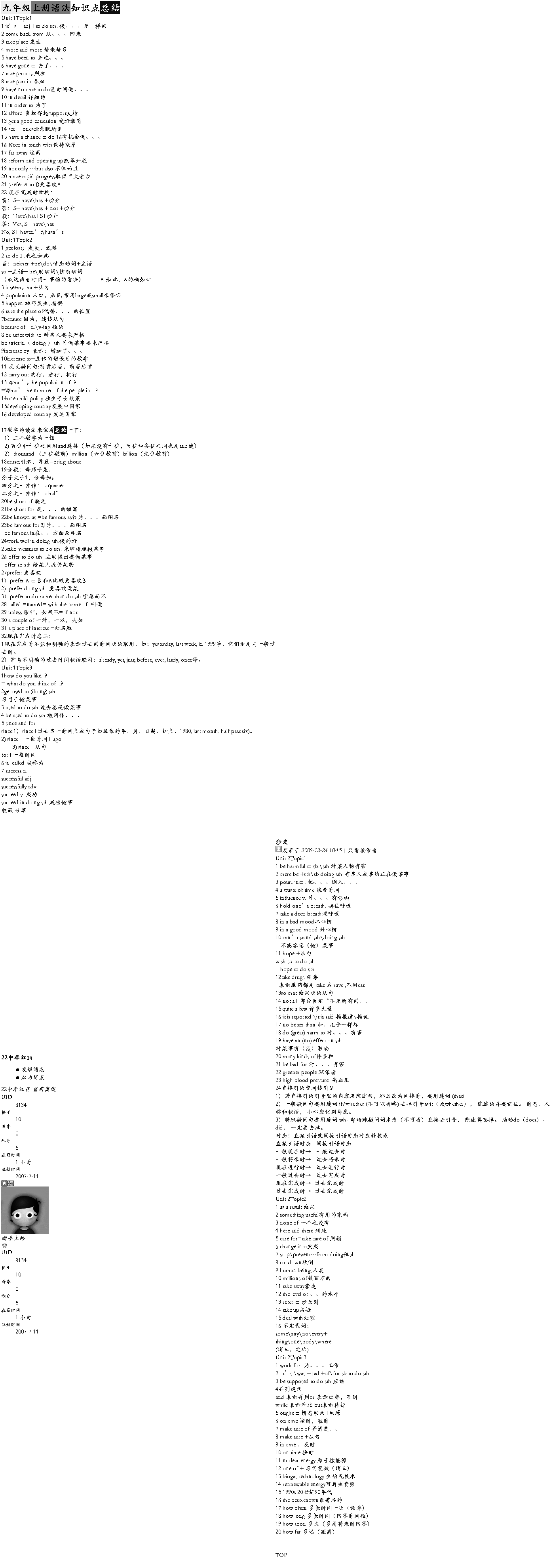

一、48个国际音标及26个英文字母的正确书写
要熟练掌握元音和辅音,5个元音字母(a, e, i, o, u),字母的正确占格及单词间距。
二、be动词的用法
be动词有三种变形,分别是:am, is, are。记忆口诀:
“我”用am, “你”用are, is用于“他、她、它”;单数全都用is,复数全部都用are。
三、人称及人称代词的不同形式(主格和宾格)
1、三种人称:第一人称(I, we),第二人称(you, you),第三人称(he, she, it, Maria)。
2、人称代词的主格,即人称代词位于句子主语位置时的形态:I, We, You, You, He, She, It, Maria。
3、人称代词的宾格,即人称代词位于句子宾语位置时的形态:me, us, you, you, him, her, it。
4、形容词性物主代词:my, our, your, your, his, her, its, their。
5、名词性物主代词:mine, ours, yours, yours, his, hers, its, theirs。
6、反身代词:myself, ourselves, yourself, yourselves, himself, herself, itself, themselves。
四、基数词(表示数量多少的词,大致相当于代数里的自然数) zero, one, two, three, four, five, six, seven, eight, nine, ten, eleven, twelve, thirteen, fourteen, fifteen, sixteen,
seventeen, eighteen, nineteen, twenty, twenty-one, twenty-two, twenty-three,twenty-four, twenty-five, twenty-six,
…… …… 余下全文
人教版初三英语上册知识点总结
九年级英语Unit 7
1. tired 累的 tiring 令人疲惫的
bored 讨厌 boring 令人厌烦/讨厌的
excited 兴奋的 exciting 令人兴奋/激动的
amazed 惊讶的 amazing 令人惊讶的
2. education n. 教育 educational 有教育意义的
3. 想要做?:would like to do 想要?:would like sth. 常用的句型有:
What would you like to do? 你想要做什么?
I would like to visit GuiLin. 我想去参观桂林。
What would you like ? 你想要什么? I would like some tea. 我想来些茶。 Would you like to go to my party? 你来不来参加我的晚会?(表邀请) Yes, I’d love/ like to . No, thanks. Would you like some tea or coffee? 你是要点茶还是咖啡? Yes, I’d love/ like. No. thanks. Where would you like to visit/ go? 你想去哪呢?(本单元的重点句型)
4. go on vacation 去度假
go on a trip 去旅行 go on a picnic 去野炊
5. hope to do 希望做某事 I hope to go to Beijing. 我希望去
北京。
hope (that) + 从句 希望?. I hope that I can go to Beijing.我希望我能去北京。
I hope (that) she can pass the test.我希望她能通过考试。
…… …… 余下全文
2014最新外研版英语九年级上册知识点总结
Module 1 Wonders of the world
短语归纳
1.wonders of the world世界奇观
natural wonders 自然奇观 man-made wonders 人造奇观
2.join in参加;加入 (活动) = take part in
3. I’m not sure. 我不确信
4. agree with sb. 同意某人的看法 sb. agree with sth. 某人适应(食物、气候) agree to do sth. 同意做某事 agree to sth.(plan /decision/suggestion) 同意/赞成 agree on sth.( plan/ ) 在……方面意见一致
5. on the eastern coast of ...在、、、、、、的东海岸
6. in one’s opinion据某人看来;按某人的意见
7. more than = over 多于,超过 8. produce electricity 供电
9. millions of 数百万的;数以百万计的
10. would like to do sth. = want to do sth. 想做某事
Would like sb. to do sth. 想要某人做某事
11. early morning 大清早 12. become grey变成灰色
13. get out of ...从....出来
14. go through 意为“穿过,强调从物体内部穿过”;从头至尾的练习
15. fall away突然向下倾斜
16. look over 从(某物上面)看过去:仔细检查
look across眺望
…… …… 余下全文
外研版初中英语重点短语、词汇典型句型总结
九年级
MODULE 1 Wonders of the world
1、a wonder of… …的奇迹
2、come in 进来
3、sit down 坐下
4、what’s happening ? 发生什么事了?
5、have a meeting 开会
6、That’s news to me! 我一点都不知道
7、school magazine 校刊
8、listen up 注意(听)
9、interview with… 对…的采访
10、why don’t sb. do sth.?=why not do sth.? 为何不…?
11、write down 记下
12、a diary of… …的日记
13、tell sb. about… 告诉某人关于…
14、write an article 写稿件
15、Any more ideas? 还有别的想法吗?
16、do some reviews about… 写一些关于…的评论;对…做评论
17、do an interview with sb. 采访某人
…… …… 余下全文
-- 中国首家承诺学习效果的在线教育公司
初三英语上册(外研版)Module 5 Museums
知识点总结
一、重点词汇
upstairs
· 原文再现
Let’s go to the Animal Room upstairs.
我们去楼上的动物室吧。
· 基本用法
upstairs adj.位于楼上的。
Marsani moved into the upstairs apartment.
马萨尼搬进了楼上的公寓里。
· 知识拓展--相关单词
upstairs adv.往楼上;在楼上,go upstairs意为“去楼上”。如:
Let’s go upstairs together.
我们一起上楼吧。
upstairs n. 楼上。如:
She doesn't use the upstairs at all any more.
她不再使用楼上了。
exhibition
· 原文再现
Come and see the monkey exhibition!
来看看猴子展览。
· 基本用法
exhibition n. 展览;展览会,see the exhibition意为“看展览”。如:
They came from far to see the exhibition.
他们从远处赶来参观这个展览会。
· 知识拓展--相关单词
1. exhibit v. 展览;陈列;展示;表现
(过去式:exhibited 过去分词: exhibited 现在分词:exhibiting 第三人称单数:exhibits)
-- 中国首家承诺学习效果的在线教育公司
He was given a whole room to exhibit his paintings.
整个房间用来展览他的画作。
2. exhibit n. 展览;展品。如:
…… …… 余下全文
新人教版英语九年级上册知识点总结
unit1
1. 通过??方式 如: by 还可以表示:“在?旁”、“靠近”、“在?期间”、“用、” “经过”、“乘车”等
如:i live by the river. i have to go back by ten o’clock. the thief entered the room by the window.
the student went to park by bus.
2. 如:the students often talk about movie after class. 学生们常常在课后讨论电影。
3. 提建议的句子:
①what/ how about +doing sth.?
如:what/ how about going shopping?
②why don’ 如:why don’t you go shopping? ③ 如:why not go shopping? ④let’ 如: let’s go shopping
⑤ 如:shall we/ i go shopping?
4. a lot 许多 常用于句末 如:i eat a lot. 我吃了许多。
5. too?to 太?而不能 常用的句型 . 如:i’m too tired to say anything. 我太累了,什么都不想说。
6. aloud, loud与loudly的用法
三个词都与"大声"或"响亮"有关。
① 重点在但声音不一定很大, 常用在读书或说话上。通常放在动词之后。aloud没有比较级 形式。如: he read the story aloud to his son.
他朗读那篇故事给他儿子听。
②loud可作形容词或副词。用作副词时,常与speak, talk, laugh等动词连用,多用于比较级,须放在动词之后。如:
she told us to speak a little louder. 她让我们说大声一点。
③loudly是副词,与loud同义,有时两者可替换使用,但往往 含有令人讨厌或打扰别人的意思,可位于动词之前或之后。如: he does not talk loudly or laugh loudly in public. 他不当众大声谈笑。
…… …… 余下全文
新目标八年级(上)英语复习提纲
Unit 1: How often do you exercise?
【语言目标】
What do you usually do on weekends? I sometimes go to the beach
How often do you eat vegetables? Every day. Most students do homework every day.
【应掌握的词组】
1. go to the movies 去看电影 2. look after = take care of 照顾
3. surf the internet 上网 4. healthy lifestyle 健康的生活方式
5. go skate boarding 去划板 6. keep healthy=stay healthy 保持健康
7. exercise=take(much)exercise=do sports锻炼 8. eating habits 饮食习惯
9. take more exercise 做更多的运动 10. the same as 与什么相同
11. be different from 不同 12. once a month一月一次
13. twice a week一周两次 14. make a difference to 对什么有影响
15. how often 多久一次 16. although = though虽然
…… …… 余下全文
